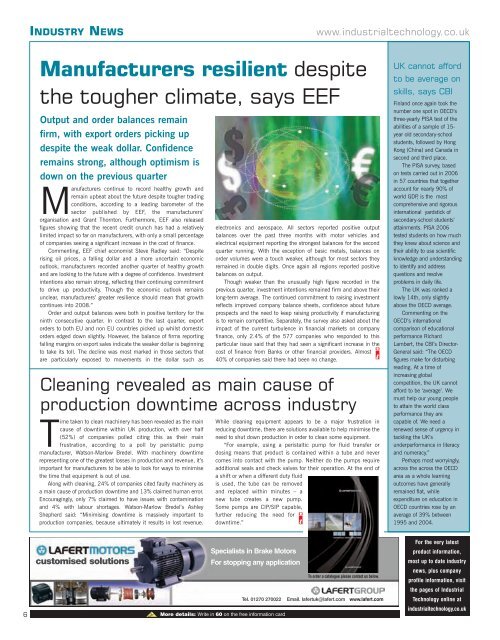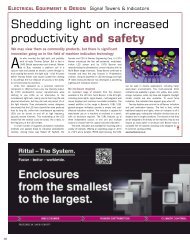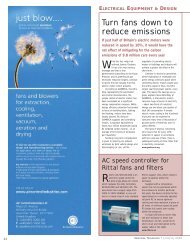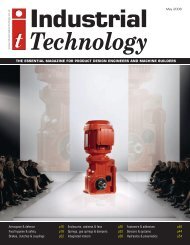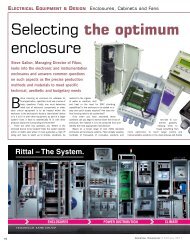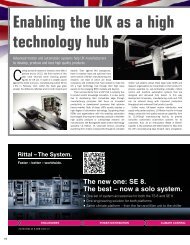IT Jan 2008 - Industrial Technology Magazine
IT Jan 2008 - Industrial Technology Magazine
IT Jan 2008 - Industrial Technology Magazine
You also want an ePaper? Increase the reach of your titles
YUMPU automatically turns print PDFs into web optimized ePapers that Google loves.
INDUSTRY NEWS<br />
www.industrialtechnology.co.uk<br />
Manufacturers resilient despite<br />
the tougher climate, says EEF<br />
Output and order balances remain<br />
firm, with export orders picking up<br />
despite the weak dollar. Confidence<br />
remains strong, although optimism is<br />
down on the previous quarter<br />
Manufacturers continue to record healthy growth and<br />
remain upbeat about the future despite tougher trading<br />
conditions, according to a leading barometer of the<br />
sector published by EEF, the manufacturers’<br />
organisation and Grant Thornton. Furthermore, EEF also released<br />
figures showing that the recent credit crunch has had a relatively<br />
limited impact so far on manufacturers, with only a small percentage<br />
of companies seeing a significant increase in the cost of finance.<br />
Commenting, EEF chief economist Steve Radley said: “Despite<br />
rising oil prices, a falling dollar and a more uncertain economic<br />
outlook, manufacturers recorded another quarter of healthy growth<br />
and are looking to the future with a degree of confidence. Investment<br />
intentions also remain strong, reflecting their continuing commitment<br />
to drive up productivity. Though the economic outlook remains<br />
unclear, manufacturers’ greater resilience should mean that growth<br />
continues into <strong>2008</strong>.”<br />
Order and output balances were both in positive territory for the<br />
ninth consecutive quarter. In contrast to the last quarter, export<br />
orders to both EU and non EU countries picked up whilst domestic<br />
orders edged down slightly. However, the balance of firms reporting<br />
falling margins on export sales indicate the weaker dollar is beginning<br />
to take its toll. The decline was most marked in those sectors that<br />
are particularly exposed to movements in the dollar such as<br />
electronics and aerospace. All sectors reported positive output<br />
balances over the past three months with motor vehicles and<br />
electrical equipment reporting the strongest balances for the second<br />
quarter running. With the exception of basic metals, balances on<br />
order volumes were a touch weaker, although for most sectors they<br />
remained in double digits. Once again all regions reported positive<br />
balances on output.<br />
Though weaker than the unusually high figure recorded in the<br />
previous quarter, investment intentions remained firm and above their<br />
long-term average. The continued commitment to raising investment<br />
reflects improved company balance sheets, confidence about future<br />
prospects and the need to keep raising productivity if manufacturing<br />
is to remain competitive. Separately, the survey also asked about the<br />
impact of the current turbulence in financial markets on company<br />
finance, only 2.4% of the 577 companies who responded to this<br />
particular issue said that they had seen a significant increase in the<br />
cost of finance from Banks or other financial providers. Almost<br />
40% of companies said there had been no change.<br />
Cleaning revealed as main cause of<br />
production downtime across industry<br />
Time taken to clean machinery has been revealed as the main<br />
cause of downtime within UK production, with over half<br />
(52%) of companies polled citing this as their main<br />
frustration, according to a poll by peristaltic pump<br />
manufacturer, Watson-Marlow Bredel. With machinery downtime<br />
representing one of the greatest losses in production and revenue, it’s<br />
important for manufacturers to be able to look for ways to minimise<br />
the time that equipment is out of use.<br />
Along with cleaning, 24% of companies cited faulty machinery as<br />
a main cause of production downtime and 13% claimed human error.<br />
Encouragingly, only 7% claimed to have issues with contamination<br />
and 4% with labour shortages. Watson-Marlow Bredel’s Ashley<br />
Shepherd said: “Minimising downtime is massively important to<br />
production companies, because ultimately it results in lost revenue.<br />
While cleaning equipment appears to be a major frustration in<br />
reducing downtime, there are solutions available to help minimise the<br />
need to shut down production in order to clean some equipment.<br />
“For example, using a peristaltic pump for fluid transfer or<br />
dosing means that product is contained within a tube and never<br />
comes into contact with the pump. Neither do the pumps require<br />
additional seals and check valves for their operation. At the end of<br />
a shift or when a different duty fluid<br />
is used, the tube can be removed<br />
and replaced within minutes – a<br />
new tube creates a new pump.<br />
Some pumps are CIP/SIP capable,<br />
further reducing the need for<br />
downtime.”<br />
UK cannot afford<br />
to be average on<br />
skills, says CBI<br />
Finland once again took the<br />
number one spot in OECD’s<br />
three-yearly PISA test of the<br />
abilities of a sample of 15-<br />
year old secondary-school<br />
students, followed by Hong<br />
Kong (China) and Canada in<br />
second and third place.<br />
The PISA survey, based<br />
on tests carried out in 2006<br />
in 57 countries that together<br />
account for nearly 90% of<br />
world GDP, is the most<br />
comprehensive and rigorous<br />
international yardstick of<br />
secondary-school students’<br />
attainments. PISA 2006<br />
tested students on how much<br />
they knew about science and<br />
their ability to use scientific<br />
knowledge and understanding<br />
to identify and address<br />
questions and resolve<br />
problems in daily life.<br />
The UK was ranked a<br />
lowly 14th, only slightly<br />
above the OECD average.<br />
Commenting on the<br />
OECD’s international<br />
comparison of educational<br />
performance Richard<br />
Lambert, the CBI’s Director-<br />
General said: “The OECD<br />
figures make for disturbing<br />
reading. At a time of<br />
increasing global<br />
competition, the UK cannot<br />
afford to be ‘average’. We<br />
must help our young people<br />
to attain the world class<br />
performance they are<br />
capable of. We need a<br />
renewed sense of urgency in<br />
tackling the UK’s<br />
underperformance in literacy<br />
and numeracy.”<br />
Perhaps most worryingly,<br />
across the across the OECD<br />
area as a whole learning<br />
outcomes have generally<br />
remained flat, while<br />
expenditure on education in<br />
OECD countries rose by an<br />
average of 39% between<br />
1995 and 2004.<br />
customised solutions<br />
Specialists in Brake Motors<br />
For stopping any application<br />
To order a catalogue please contact us below.<br />
For the very latest<br />
product information,<br />
most up to date industry<br />
news, plus company<br />
profile information, visit<br />
the pages of <strong>Industrial</strong><br />
<strong>Technology</strong> online at<br />
industrialtechnology.co.uk<br />
Tel. 01270 270022 Email. lafertuk@lafert.com www.lafert.com<br />
6<br />
More details: Write in 60 on the free information card


